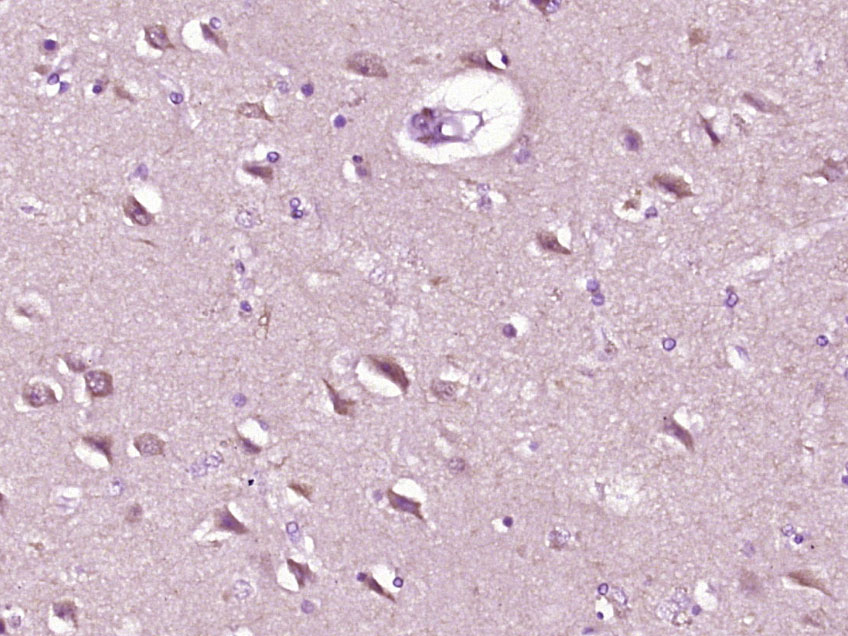
Rabbit Anti-phospho-PAK1/2/3 (Thr423)antibody
PAK1 + PAK2 + PAK3 (phospho T423); PAK1/2/3 (phospho Thr423); PAK1/2/3 (phospho T423); Alpha PAK; Beta PAK; Gamma PAK; Oligophrenin 3; OPHN3; p21 activated kinase 1; p21 Activated Kinase 1 + 2 + 3; p21 activated kinase 2 ; p21 activated kinase 3; P65 PAK;
View History [Clear]
Details
Product Name phospho-PAK1/2/3 (Thr423) Chinese Name 磷酸化p21激活激酶1/2/3抗体 Alias PAK1 + PAK2 + PAK3 (phospho T423); PAK1/2/3 (phospho Thr423); PAK1/2/3 (phospho T423); Alpha PAK; Beta PAK; Gamma PAK; Oligophrenin 3; OPHN3; p21 activated kinase 1; p21 Activated Kinase 1 + 2 + 3; p21 activated kinase 2 ; p21 activated kinase 3; P65 PAK; PAK1; PAK2; PAK3; PAK3beta; PAK65; PAKalpha; PAKgamma; S6/H4 kinase; Serine/threonine protein kinase PAK 1; Serine/threonine protein kinase PAK 2; Serine/threonine protein kinase PAK 3; Serine/threonine protein kinase PAK1; Serine/threonine protein kinase PAK2; Serine/threonine protein kinase PAK3; PAK1_HUMAN; PAK2_HUMAN; PAK3_HUMAN. Product Type Phosphorylated anti Research Area Tumour Cell biology Neurobiology Signal transduction Apoptosis transcriptional regulatory factor Kinases and Phosphatases Immunogen Species Rabbit Clonality Polyclonal React Species Human, (predicted: Mouse, Rat, Chicken, Dog, Pig, Cow, Rabbit, ) Applications WB=1:500-2000 ELISA=1:5000-10000 IHC-P=1:100-500 IHC-F=1:100-500 IF=1:100-500 (Paraffin sections need antigen repair)
not yet tested in other applications.
optimal dilutions/concentrations should be determined by the end user.Theoretical molecular weight 60kDa Cellular localization cytoplasmic The cell membrane Form Liquid Concentration 1mg/ml immunogen KLH conjugated Synthesised phosphopeptide derived from human PAK1 around the phosphorylation site of Thr423: RS(p-T)MV Lsotype IgG Purification affinity purified by Protein A Buffer Solution 0.01M TBS(pH7.4) with 1% BSA, 0.03% Proclin300 and 50% Glycerol. Storage Shipped at 4℃. Store at -20 °C for one year. Avoid repeated freeze/thaw cycles. Attention This product as supplied is intended for research use only, not for use in human, therapeutic or diagnostic applications. PubMed PubMed Product Detail The p21 activated kinases (PAK) are critical effectors that link Rho GTPases to cytoskeleton reorganization and nuclear signaling. The PAK proteins are a family of serine/threonine kinases that serve as targets for the small GTP binding proteins, CDC42 and RAC1, and have been implicated in a wide range of biological activities. The protein encoded by this gene is activated by proteolytic cleavage during caspase-mediated apoptosis, and may play a role in regulating the apoptotic events in the dying cell.
P21-activated kinase (PAK) is actually a family of serine/threonine protein kinases, members of which are activated by small molecular weight GTPases. The three most common isoforms are PAK 1, PAK 2, and PAK 3 (also known as alpha PAK, gamma PAK, and beta PAK, respectively). These kinases contain numerous regulatory elements that trigger diverse signaling processes such as those initiated by activated GTPases, interaction with Src homology 3 (SH3) domains, and caspase mediated proteolytic cleavage. Autophosphorylation of serine 141 (serine 144 for PAK 1 and serine 139 PAK 3), catalyzed by Cdc42, is required for activation of PAK.
Function:
The activated kinase acts on a variety of targets. Likely to be the GTPase effector that links the Rho-related GTPases to the JNK MAP kinase pathway. Activated by CDC42 and RAC1. Involved in dissolution of stress fibers and reorganization of focal complexes. Involved in regulation of microtubule biogenesis through phosphorylation of TBCB. DVL1 and PAK1 form a ternary complex with MUSK which is important for MUSK-dependent regulation of AChR clustering during the formation of the neuromuscular junction (NMJ). Activity is inhibited in cells undergoing apoptosis, potentially due to binding of CDC2L1 and CDC2L2. Phosphorylates MYL9/MLC2. Phosphorylates RAF1 at 'Ser-338' and 'Ser-339' resulting in: activation of RAF1, stimulation of RAF1 translocation to mitochondria, phosphorylation of BAD by RAF1, and RAF1 binding to BCL2.
Subunit:
Homodimer in its autoinhibited state. Active as monomer. Interacts tightly with GTP-bound but not GDP-bound CDC42/P21 and RAC1. Binds to the caspase-cleaved p110 isoform of CDC2L1 and CDC2L2, p110C, but not the full-length proteins. Component of cytoplasmic complexes, which also contain PXN, ARHGEF6 and GIT1. Interacts with ARHGEF7. Also interacts with CRIPAK. Interacts with NISCH. Interacts with DVL1; mediates the formation of a DVL1, MUSK and PAK1 ternary complex involved in AChR clustering. Probably found in a ternary complex composed of DSCAM, PAK1 and RAC1. Interacts with DSCAM (via cytoplasmic domain); the interaction is direct and enhanced in presence of RAC1. Interacts with SCRIB. Interacts with PDPK1. Interacts (via kinase domain) with RAF1. Interaction with NCK1 and NCK2.
Subcellular Location:
Cytoplasm. Cell junction, focal adhesion. Note=Recruited to focal adhesions upon activation.
Post-translational modifications:
Autophosphorylated when activated by CDC42/p21 and RAC1. Phosphorylation at Thr-423 by PDPK1 results in its activation.
Similarity:
Belongs to the protein kinase superfamily. STE Ser/Thr protein kinase family. STE20 subfamily.
Contains 1 CRIB domain.
Contains 1 protein kinase domain.
SWISS:
Q13153
Gene ID:
5058
Database links:Entrez Gene: 5058 Human
Entrez Gene: 18479 Mouse
Omim: 602590 Human
SwissProt: Q13153 Human
SwissProt: O88643 Mouse
Unigene: 435714 Human
Unigene: 260227 Mouse
Unigene: 9149 Rat
PAK1-3蛋白具有广泛的生物学功能,也是一个保守的丝氨酸/苏氨酸蛋白激酶,参与许多重要的细胞活动。包括Cytoskeleton的动力学调节,细胞移动,生存和凋亡,细胞周期,基因转录调节,细胞生长Signal transduction和转化等。Product Picture
Bought notes(bought amounts latest0)
No one bought this product
User Comment(Total0User Comment Num)
- No comment



 +86 571 56623320
+86 571 56623320
 +86 18668110335
+86 18668110335

